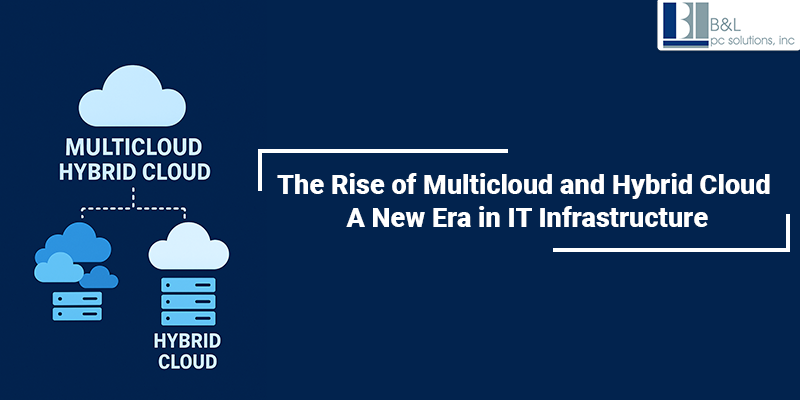
Currently, cloud computing is becoming the foundation for companies in the IT and technology sectors. Due to the rising adoption of cloud systems, two major trends emerged: multicloud and hybrid cloud. Though both have their peculiarities, it’s better to delve into what these terms refer to and why your business should adopt them.
In this blog, we take a look at the difference between multicloud and hybrid cloud, how it works, and how it can be helpful in your organization. Regardless of whether you are seeking scalability, cost reduction, or enhanced performance, being informed about the cloud strategies, this guide will help you make better decisions.
You will have a good understanding of the fundamentals and how the concept of multicloud and hybrid cloud setups can change the IT environment of your organization by the end of this blog.
What is Multicloud?
A strategy or architecture called multicloud allows you to use the services of two or more cloud providers. With a multicloud system, you don’t have to invest all your resources and applications in a single cloud platform (AWS, Google Cloud, Microsoft Azure, etc.). You can employ these platforms to match your particular business requirements. As an example, you can execute other applications in Microsoft Azure, save data in Amazon Web Services (AWS), and undertake machine learning jobs in the Google Cloud.
Why Multicloud?
- Decreased Vendor Lock-In: With the consumption of multi-cloud services, you will not be stuck with a service provider, which can be fatal following failures in service delivery and price increments.
- Best-in-Class Solutions: Each cloud provider has its specific services, and multicloud will enable you to make use of the most beneficial services of all of them.
- Enhanced Resilience and Redundancy: In case there is downtime on one of the cloud services, your applications executing on other clouds can still be active.
What is Hybrid Cloud?
A hybrid cloud is a setting that combines cloud computing services with on-premise infrastructures. The concept behind this is that you will have a portion of your applications or data on a private cloud or your in-house data center, and your other services will be on the public cloud, such as AWS, Azure, or Google Cloud.
Why Hybrid Cloud?
- Scalability: Hybrid clouds provide you with options to migrate your workloads between a public cloud and a private one in response to changing demands in your business.
- Cost Control: You may control the cost by having critical or sensitive applications be on-premise (this will lower recurring cloud costs to the public clouds), but still take advantage of the size of public clouds to support less sensitive workloads.
- Better Security: By keeping sensitive or important data in a private cloud, hybrid systems may offer a higher degree of security and compliance.
How Multicloud and Hybrid Cloud Differ Most Significantly
With both solutions being adaptable and providing improved control, multicloud and hybrid cloud do have differences that should be considered:
Why Does Your Company Need a Hybrid or Multicloud Cloud?
With the rising popularity of cloud, organizations are gaining significant benefits in the multicloud and hybrid cloud setups. Here are some reasons why you should think of applying one of these models in your business:
- Cost Savings: A combination of public and private clouds helps businesses to streamline their expenses on a large scale by selecting the most affordable services to undertake a specific workload.
- Scalability: You even have the chance of scaling resources in the cloud. Cloud solutions can expand as your company grows, whether you have a small business or a big company.
- Business Continuity: A multiple cloud provider or hybrid model means that in the event of any interference, you will still run your operation with minimal downtime.
- Regulatory Compliance: A hybrid cloud also permits you to store sensitive data on-premise and enjoy the benefits of the public clouds when your business is operating within a regulated industry.
Using the services of a leading and reputable computing service provider on Long Island is highly recommended.
Multicloud and Hybrid Cloud Management Best Practices
- Implement a Centralized Management Platform: Managing different cloud platforms can be challenging. Manage your services in all cloud providers with a centralized platform that monitors all of them.
- Secure Data and Compliance: As a multiplatform, data security is of prime concern. Ensure that encryption and access control guidelines are regularly followed, taking into account applicable laws and regulations, such as the GDPR and HIPAA.
- Ease the Loads: Not every work should be done in the cloud. Make sure that your workloads are optimizable either by on-premise infrastructure or by public clouds.
- Constant Monitoring: Review cloud performance and costs regularly. A proactive strategy makes the inadequacies easier to identify before they grow into bigger problems.
Conclusion
To summarize, multicloud and hybrid cloud systems include more functionalities in the form of savings on costs, adaptability, and scalability of businesses. With their cloud infrastructure, they enable companies to leverage the best features of both public and private clouds within their infrastructure. You may decide to adopt multicloud because of its ability to select various cloud service providers, or you may opt to use the hybrid model to avoid storing sensitive data in the cloud. But there is no uniform answer.
When you are prepared to make a difference in terms of taking your company to the next stage and bringing the advantages of multicloud or hybrid cloud, engaging the help of an experienced computing service provider on Long Island may prove to be a useful difference-maker.
Want to Escalate a Multicloud or Hybrid Cloud Strategy?
As you adopt a multicloud or hybrid cloud solution in your business, B&L PC Solutions can work with you on that. As a reliable provider of Managed IT Services in Tampa, we are the experts in developing decentralized and affordable cloud solutions that will address your requirements. Our professionals can offer advice and help you to optimize your infrastructure to the point where it is optimized for performance discovery, protection, and development.
FAQs
- What is the best difference between multicloud and hybrid cloud?
Multicloud has a broad set of cloud services provided by different providers, compared to hybrid clouds, which are a combination of cloud services that are usually resource-rich and are offered publicly. - What are the Multicloud advantages?
A multicloud environment offers scalability, vendor lock-in, and increased accessibility. - Does the hybrid cloud protect better than the public cloud?
The hybrid clouds may enable greater control of safety since the companies may safeguard sensitive data on the private clouds; nonetheless, the safety is high in public clouds too. - Which of the two, multicloud and hybrid cloud, do I select in my business?
The requirements of your company will determine this. The multi-cloud will suit you better if you require special services. When you have sensitive information that is supposed to remain on-site, a hybrid cloud is perfect. - How does B&L PC solutions assist in embracing multicloud and hybrid clouds?
We offer consultancy, strategy, and management services to make your multi-cloud or hybrid cloud environment safe, cost-effective, and performing.
Want to Know Multicloud and Hybrid Cloud Solutions?
Stay in contact with B&L PC Solutions, your trustworthy partner for IT support services in Tampa. We will collaborate to develop our personalized cost-efficient cloud strategy to fit our needs. Call us now to find out more!
Tags: CloudComputing, CloudSolutions, Multicloud





